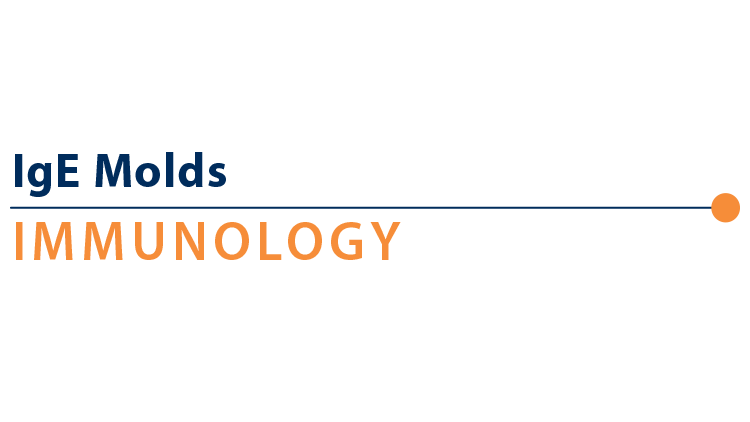Description
Identify Indoor and Outdoor Mold Allergies
The IgE Mold Profile is a blood test that measures IgE antibodies to 15 common indoor and outdoor molds. The panel also includes a total IgE measurement. Everyone breathes in airborne mold spores, and in people with mold allergies, symptoms mainly affect the respiratory tract. Testing for mold allergies can identify whether mold is causing the symptoms. The patient can experience relief with symptom management, and by avoiding ongoing exposure to the mold source.
When should testing for IgE Mold Antibodies be considered?
Testing for IgE mold antibodies is useful for individuals who suspect that they are reacting to an environmental stimulus. Household molds can persist throughout the year and are found in household plants and damp places, such as bathrooms, kitchens, and basements, or in areas that have been exposed to leaks or flooding. Outdoor airborne mold ranges from extremely low levels in freezing temperatures to peak levels in late summer and early fall. Warmer, humid climates can have elevated mold counts year-round.
An IgE allergic response involves immediate-hypersensitivity to a substance. It is important to test when the patient is symptomatic. Circulating IgE antibodies have a short half-life of around 1-2 days, and will only be produced after exposure to the substance. According to the American Academy of Allergy, Asthma, and Immunology, “A key message is that a positive allergy test result (skin or blood) indicates only the presence of allergen-specific IgE (called sensitization). It does not necessarily mean clinical allergy (i.e., allergic symptoms with exposure).”1 Therefore, test results should always be viewed in the context of the overall clinical picture.
Symptoms and conditions associated with IgE mold allergies
- Stuffy or itchy nose, sneezing, rhinitis or sinusitis
- Itchy, teary eyes, conjunctivitis
- Cough, shortness of breath, wheezing, asthma
- Skin rash or hives
Occupations at greater risk of developing a mold allergy2
- Farmers
- Dairyworkers
- Loggers
- Bakers
- Mill workers
- Carpenters
- Greenhouse employees
- Winemakers
- Furniture repairers
Ordering the test
The IgE Mold Profile can be ordered as a stand-alone test or bundled with other profiles. Often times, clinicians will bundle several smaller profiles in order to see a more complete picture of the patient’s immune-mediated response. Profiles that can be bundled include:
| Profile | Includes |
| IgG Foods | 87 foods plus total IgE |
| IgG Vegetarian | 21 foods plus total IgE |
| IgG Spices | 23 spices plus total IgE |
| IgE Foods | 19 foods plus total IgE |
| IgE Molds | 15 molds plus total IgE |
| IgE Inhalants | 16 inhalants specific to 18 North American geographic regions plus total IgE |
| Celiac and Gluten Sensitivity | Total IgA, tTG IgA, DGP IgA, EMA IgA, Anti-Gliadin IgG & IgA |
What advantage does the IgE Mold Profile offer compared to other diagnostics?
Identifying airborne allergens can be difficult and testing serum allergen-specific IgE antibodies is helpful. Allergen-specific serum IgE testing does not involve introducing an allergen in order to test. Instead, already circulating antibodies are measured, however, the patient must have been exposed to the allergen in the days leading up to testing in order to detect antibodies.
A skin-prick test involves the injection of an allergen on the skin then observation for a reaction. Serum testing can be especially useful when skin-prick tests cannot be performed for example, due to extensive dermatitis or dermatographism, when antihistamines cannot be discontinued, or those with a history of anaphylactic reaction.3
Biotoxin illness related to chronic inflammatory response syndrome (CIRS) has become an emerging field of research. Biotoxin illness is not an IgE-mediated allergic reaction. Instead, patients may experience mold toxicity as a systemic inflammatory response. Genova does not offer CIRS testing. Genova’s mold testing is specific to the allergic response only.
Genova’s Methodology
IgE Antibody Testing
Genova utilizes the FDA-cleared Siemans Immulite® 2000 Total IgE and 3gAllergy Specific IgE Universal Kits. Immulite® 2000 Total IgE is a solid-phase Chemiluminescent assay. Immulite® 3gAllergy Specific IgE is a solid phase, two-step, chemiluminescent immunoassay that exploits liquid phase kinetics in a bead format. Siemens proprietary liquid allergens are the key to making IMMULITE® 2000 Immunoassay allergy tests sensitive, specific, and reliable. The soluble polymer/copolymer support for the allergens increases the number of binding sites and their accessibility to allergen-specific IgE antibodies. Enzyme-enhanced chemiluminescent signal detection provides increased sensitivity and the proprietary wash technique enhances specificity.
What can clinicians and patients expect from IgE Mold testing?
In general, clinical management of the patient with mold allergies involves medicines, allergy shots and/or supplements to manage symptoms, as well as cleaning and preventing further mold growth and exposure in the household. HEPA filters, exhaust fans, dehumidifiers, regular cleaning practices, and fixing water leaks may help to reduce the mold burden.1
Please visit our IgG, IgE, and Celiac Tests Prep page prior to ordering the test to learn about medications that may impact test results, length of exposure to antigens, pediatric testing, and diseases that may affect antibody levels.
Test Type: Blood Test



